
Lolita Ritmanis, Michael McCuistion, Kristopher Carter to be featured guests at "PlayFest" in Spain
by James Harvey
The BSOSpirit Association - organizing the first edition of PlayFest, the music, animation and video games festival which will be held in Úbeda from the 23rd to the 29th July 2012. - has announced the attendance of Lolita Ritmanis, Michael McCuistion and Kristopher Carter (Dynamic Music Partners), the trio that met while working for the great Shirley Walker on the animated TV series Batman: The Animated Series, to the highly-anticipated festival. Michael, Kristopher and Lolita have been writing music for TV, film, video games and the concert hall for over fifteen years, receiving numerous Emmy nominations and receiving the award in 2002 for their work on the series Batman Beyond. Among their credits are the animated series The New Adventures of Batman and Superman, Batman Beyond, Justice League and Justice League Unlimited, Teen Titans, Legion of Super Heroes, Ben 10: Ultimate Alien, The Spectacular Spider-Man, Batman: The Brave And The Bold and the recent Young Justice. All of them have obtained great critical and commercial success.
After years of composing together they discovered the virtues of joining forces, and in 2004 they founded Dynamic Music Partners and have worked as a team ever since. All of them have shown their talent on solo projects, but certainly they have proven that their work together is much more than the sum of their talents. BSOSpirit is honored to welcome such experienced musicians in the world of animation, calling it a luxury to add their names to the lineup of guests for PlayFest. Click here for the PlayFest website.
Dynamic Music Partners sat down with The World's Finest to discuss their upcoming appearance at Playfest and what they have in store! Take it away...
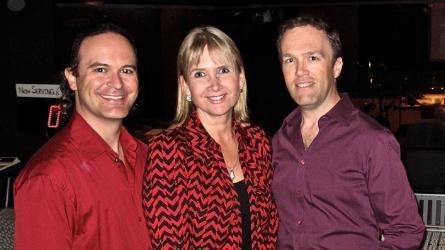 The World's Finest: First off, Dynamic Music Partners (DMP) will be guests at Play Fest 2012 in Ubeda, Spain. Can you give us a quick low-down on what Play Fest is?
The World's Finest: First off, Dynamic Music Partners (DMP) will be guests at Play Fest 2012 in Ubeda, Spain. Can you give us a quick low-down on what Play Fest is?
Lolita Ritmanis: PlayFest is a festival celebrating music for animation and video games. During the week of July 23rd through the 29th the Andalucian town of Úbeda will be buzzing, as fans of music for animation and video games flock to this relatively small town. The concert on Saturday, July 28th will feature music for animation and video games, performed by an 80-piece orchestra and a 60-voice choir. The outdoor setting for the concert is quite spectacular. During the week there will be an array of workshops and panels for fans as well as for composers. We are honored to be invited to this festival. We will be conducting our music at the concert on the 28th, as well as sharing our music during several panels that we will be participating in.
WF: Do you know what material you’ll be drawing from for your appearance at Play Fest? You will also be part of a panel discussion – can you fill us in on that?
Kristopher Carter: We will be presenting the world premiere performance of suites from Batman and Mr. Freeze: Subzero, Batman: Mystery of the Batwoman, a brand new suite from Batman Beyond: Return of the Joker, as well as selections from our television themes and scores to Batman: The Brave and The Bold, Justice League, Justice League Unlimited, and Ben10. For the panels, we will present a master class for young composers on film scoring techniques, a panel showcasing a cross-section of music from the many popular shows we have worked on over the years and we will also participate in a discussion honoring our mentor Shirley Walker.
WF: You'll be honoring Shirley Walker at PlayFest. Can you share with us her role in DMP's creation and how she remains an influence even today? How do you plan to honor her at PlayFest?
Michael McCuistion: If it weren't for Shirley, the three of us certainly would never have been working together as closely as we have been. Although Shirley wasn't directly involved in the formation of DMP, she definitely had an influence in that we developed similar work styles and approaches while being mentored by her. By the time we formed DMP we were already very compatible in the way we approached scoring a project. We don't know any specific details about her tribute at PlayFest, but I'm so happy that we'll be able to be there to experience it along with all the other people who love her and miss her and her music so much.
WF: Now, we basically know the story of how DMP came together. How do you stay together, choose your projects, and basically plan ahead? Is it always a unanimous decision?
LR: We take pride in running a well-oiled machine. First and foremost are the relationships we build with our clients. We take great care to plan our music spotting sessions and music preview sessions so that we can collaborate in a very personal way with the producers of the show. We never phone it in. We choose our projects, but truthfully, the way it works is that the producers of the projects choose us. Very rarely does a project get handed to us. In this era, there are many people on the creative team of a series that need to weigh in on the choice of composers. We meticulously plan pretty much every phase of our work process. We have not yet run into a situation where the decision to accept work has been anything other than a unanimous decision.
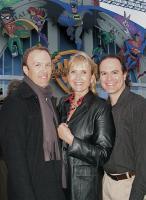 WF: A couple of your recent projects were so...opposite of each other. Batman: The Brave and The Bold and Young Justice. Could you run down your approach to both of those series, and how their unique tones set up some very unique score work from DMP? In particular, what was your inspiration for Young Justice’s score.
WF: A couple of your recent projects were so...opposite of each other. Batman: The Brave and The Bold and Young Justice. Could you run down your approach to both of those series, and how their unique tones set up some very unique score work from DMP? In particular, what was your inspiration for Young Justice’s score.
KC: As a series, Batman: The Brave and The Bold painted a version of Batman that was lighter than some of the other animated incarnations we have scored, freely mixing comedy with the expected mystery, danger and action. There was an unmistakable element of fun in the show that we could not ignore as we created the music, and we felt that a more jazzy approach would bring the right energy and still have the stylistic latitude to be ominous and dangerous when the scenes needed it. And, of course, we needed bongo drums! Producer James Tucker asked that bongos be used in the score as a rhythmic element to drive the action scenes. Greg Weisman and Brandon Vietti, the producers of Young Justice, had a particular vision of the way they wanted music to work with the scenes and specific emotions they wanted to evoke, and so we all had discussions together on a unique approach to scoring that show. We placed an emphasis on ethnic percussion, non-melodic sounds and ambient textures to capture the gritty, edgy covert-ops world of our young heroes.
WF: Just to touch upon Young Justice again for a moment, your score work here is unlike anything you've done before. Is this something you seek out when deciding projects, how to challenge yourself? Can you run us through some of your most challenging projects today, be it in animation live-action, or beyond?
MM: When Brandon and Greg came to us with their ideas about the look and feel of Young Justice, we were instantly excited about the opportunity to do something different with the score. With a career that spans many years it's important that inspiration remains fresh. So, for each new production that we score, we definitely strive to create a unique sound that musically identifies that project. Then, within that sound, we have the freedom to do many subtle things while exploring the musical details of that universe. For example, we recently scored a live-action feature film called Broke Sky that had southern blues guitar gestures as the main musical element but then gradually departs from that as the story develops. And we just finished a short live-action film called Game Day in which the underscore is almost entirely marching band source, eventually evolving into an underscore/source hybrid by the end of the film. We really enjoy finding a unique musical sound for each project that will be different and unusual and stimulate us creatively.
WF: How does a show or movie’s character influence your musical choices. The Spectacular Spider-Man’s score had a great youthful exuberance to it, Justice League felt heroic, Batman Beyond was edgy and dirty. How much research and input do you get from a show’s creative team when deciding how you approach a score? What role do you want your score to play when approaching these shows?
LR: We research a show in great detail before we embark on the process of composition. Often the producer of the show will have some idea of the direction he wants to take with the project. We have yet to work on a series where we have a completely blank canvas concept wise. Creatively it is hard work to fine tune what the vibe of the show will be. This is a collaborative process all the way. When the choices we make in the composing process hit the mark for the producer, it is a very powerful feeling. We are not mind readers, but we certainly have learned a great deal about what kind of questions to ask.
WF: To quickly touch upon it, DMP has also done some video game work. How complicated is it to create a score for a video game as opposed to a television show or movie? What do you have to take into account in this arena that you wouldn’t anywhere else?
KC: Our approach to video games isn't nearly as different from film scoring as one might expect. Like a film, music for games also needs to give the project a strong, uniquely-identifyable sound, be well-produced and recorded, and compositionally interesting. The main difference has to do with the non-linear nature of games—you have to keep in mind certain sections may not play in the same sequence as originally conceived, or also that they might loop for a long period of time based on the way the players interact with the game.
MM: Another difference is that the final rendering of the game is often not complete until after the music has been delivered. So, rather than working to a picture which has been carefully timed and edited and is rich with acting and expression, we rely much more on the story of the game itself and our idea of what the final visuals will eventually become. The wonderful thing about that is that with each game we've been involved with the visuals and final product turned out way better than we could have ever imagined!
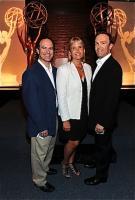 WF: Also, DMP has been credited with doing some work on the DC comics theatrical logos and the like. I imagine finding the right cuts and sound for a brief 15 or 30 second logo is exceedingly difficult, maybe even more so than scoring an episode. Can you briefly give us an idea of how you score one of these logo animations? What choices and decisions do you have to make, and is it a long approval process, when coming up with small snippets of music?
WF: Also, DMP has been credited with doing some work on the DC comics theatrical logos and the like. I imagine finding the right cuts and sound for a brief 15 or 30 second logo is exceedingly difficult, maybe even more so than scoring an episode. Can you briefly give us an idea of how you score one of these logo animations? What choices and decisions do you have to make, and is it a long approval process, when coming up with small snippets of music?
MM: Any project that has a very small amount of music with extremely high visibility and featured profile requires a very different process than scoring under dialog and action. Generally, we will score these types of projects as a group, with each of us bringing our separate ideas together to form the finished theme. It's a lot like songwriting, with the three of us in a room at the same time all contributing to the flow of the writing. Since these pieces are generally very short, often nowadays five seconds or less, each note and each sound becomes very important. So, we examine and re-examine what we've done before we submit it. Then, usually several committees of people will have input on what they're hearing from us, and there will be a multi-tiered back-and-forth process with us doing revisions based on continuing feedback until everyone is satisfied. It's tedious, but when you're able to experience the music being featured on screen without any sound effects or dialog, it's ultimately rewarding.
WF: A bit off-topic-ish, but fans are clamoring to for more scores from Batman: The Animated Series - among other DC animated programs – to be released. Any words of advice on what we can do to let Warner Bros. know there is a huge market for this? Is there any bit of your work you’d particularly like to see released on CD/download?
LR: I can tell you that the clamoring has been heard. La-La Land records will be releasing several of the titles that the fans have been asking for. It is a very exciting time for us in that regard. Stay tuned!
WF: To bring it back to where we started off, and I know you kind of already answered this, but any chance some of the above mentioned shows will be highlighted during Play Fest 2012? Any last words to let the fans know why they shouldn’t miss this great event, with the DMP crew conducting on July 27th?
KC: Yes, most of the ones mentioned above will be! We're so excited with the opportunity to share our music in this venue with the outstanding orchestra and choir. One of the most compelling reasons to attend this festival is that fans will be able to experience some of their favorite music in "better-than-stereo LIVE" that can't be heard anywhere in the world outside of the shows for which it was originally composed. We hope to see you there!
Click here for the more details on the PlayFest event.
The World's Finest would like to thank Lolita Ritmanis, Michael McCuistion & Kristopher Carter - Dynamic Music Partners - for their
participation in this Q&A.
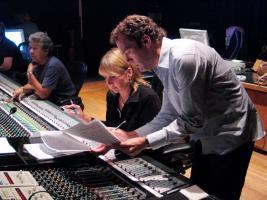
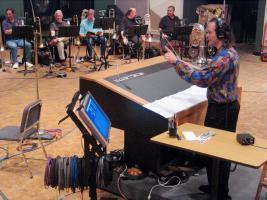
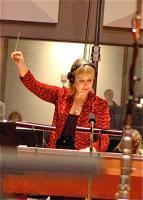
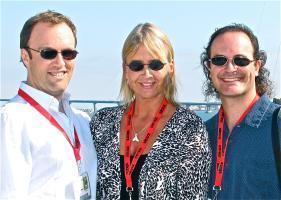
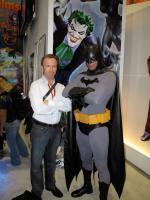
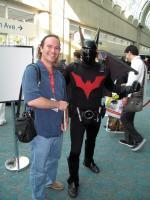
Click on the above images for a closer look!